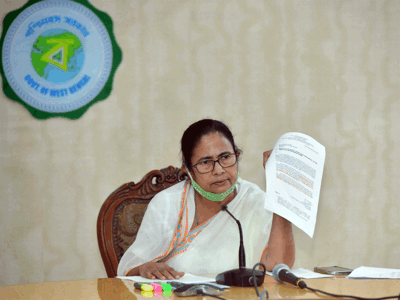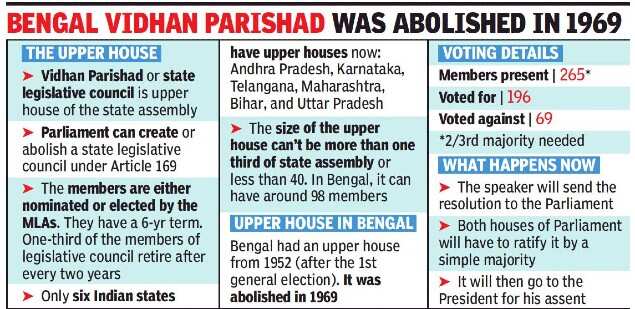Top Searches
- News
- City News
- kolkata News
- West Bengal: Upper house motion passed by more than 2/3 majority
West Bengal: Upper house motion passed by more than 2/3 majority

The formation of a legislative council was also part of the Trinamool Congress’s election manifesto. (Photo: ANI)
KOLKATA: The state assembly on Tuesday initiated a move to revive the Vidhan Parishad in Bengal, passing a resolution by more than two-thirds majority with 196 MLAs voting in favour and 69 against.
The move to give the state a bicameral legislature came 52 years after the state assembly voted to abolish it. But whether Bengal finally gets a legislative council or not will depend entirely on Parliament’s approval, say Constitution experts.

State parliamentary affairs minister Partha Chatterjee tabled the resolution for the creation of a legislative council, which BJP legislators said would be a “financial drain” on the state’s resources and allow “backdoor entry to the assembly to people who lost the recent polls”. Trinamool MLAs, however, countered this by citing Uttar Pradesh, Karnataka and Bihar as examples of states where the BJP was in office and which had legislative councils.
Chief minister Mamata Banerjee, state finance minister Amit Mitra and state agriculture minister Sovandeb Chattopadhyay are three seniors who are not members of the assembly and have time till this November to become so. Bypolls to seven assembly seats are due in Bengal and the state government has already expressed its readiness to conduct them after the decline in Covid cases. The Election Commission, however, has not announced any timeline. The formation of a legislative council was also part of the Trinamool Congress’s election manifesto.
“The time and context for the abolition and the reintroduction of the legislative council have changed. The population and representation of people have changed. And, if cost is the only issue (for opposing this), why have states like UP, Bihar, Karnataka retained the upper house? And, if it is such a dispensable idea, then why has Andhra Pradesh abolished it twice and reintroduced it twice?” Chatterjee asked. The proposed council would be partly nominated, partly elected, he added.
Assembly opposition leader and BJP MLA Suvendu Adhikari, however, gave ample indication that the Bengal assembly’s resolution might hit a roadblock in Delhi. “This has to be passed by Parliament, where the BJP has a majority. We are opposed to a bi-cameral legislature in Bengal,” Adhikari said. BJP MLA Shankar Ghosh wondered what could come out of a legislative council that might cost the exchequer Rs 600 crore in six years. Lone ISF MLA Naushad Siddiqui, too, opposed the resolution but Chatterjee said the opposition should not “oppose the resolution for opposition’s sake”.
Article 171 caps the strength of a legislative council in Bengal at 98 members. The state’s first post-Indian Independence legislative council had 51 members, which was increased to 75 in 1957 before being abolished in August 1969. Between 29% and 36% members of the council were elected by MLAs in the 1951-1969 phase; the rest were nominated. The governor, too, could nominate members.
The move to give the state a bicameral legislature came 52 years after the state assembly voted to abolish it. But whether Bengal finally gets a legislative council or not will depend entirely on Parliament’s approval, say Constitution experts.

State parliamentary affairs minister Partha Chatterjee tabled the resolution for the creation of a legislative council, which BJP legislators said would be a “financial drain” on the state’s resources and allow “backdoor entry to the assembly to people who lost the recent polls”. Trinamool MLAs, however, countered this by citing Uttar Pradesh, Karnataka and Bihar as examples of states where the BJP was in office and which had legislative councils.
Chief minister Mamata Banerjee, state finance minister Amit Mitra and state agriculture minister Sovandeb Chattopadhyay are three seniors who are not members of the assembly and have time till this November to become so. Bypolls to seven assembly seats are due in Bengal and the state government has already expressed its readiness to conduct them after the decline in Covid cases. The Election Commission, however, has not announced any timeline. The formation of a legislative council was also part of the Trinamool Congress’s election manifesto.
“The time and context for the abolition and the reintroduction of the legislative council have changed. The population and representation of people have changed. And, if cost is the only issue (for opposing this), why have states like UP, Bihar, Karnataka retained the upper house? And, if it is such a dispensable idea, then why has Andhra Pradesh abolished it twice and reintroduced it twice?” Chatterjee asked. The proposed council would be partly nominated, partly elected, he added.
Assembly opposition leader and BJP MLA Suvendu Adhikari, however, gave ample indication that the Bengal assembly’s resolution might hit a roadblock in Delhi. “This has to be passed by Parliament, where the BJP has a majority. We are opposed to a bi-cameral legislature in Bengal,” Adhikari said. BJP MLA Shankar Ghosh wondered what could come out of a legislative council that might cost the exchequer Rs 600 crore in six years. Lone ISF MLA Naushad Siddiqui, too, opposed the resolution but Chatterjee said the opposition should not “oppose the resolution for opposition’s sake”.
Article 171 caps the strength of a legislative council in Bengal at 98 members. The state’s first post-Indian Independence legislative council had 51 members, which was increased to 75 in 1957 before being abolished in August 1969. Between 29% and 36% members of the council were elected by MLAs in the 1951-1969 phase; the rest were nominated. The governor, too, could nominate members.
FacebookTwitterLinkedinEMail
Start a Conversation
end of article
